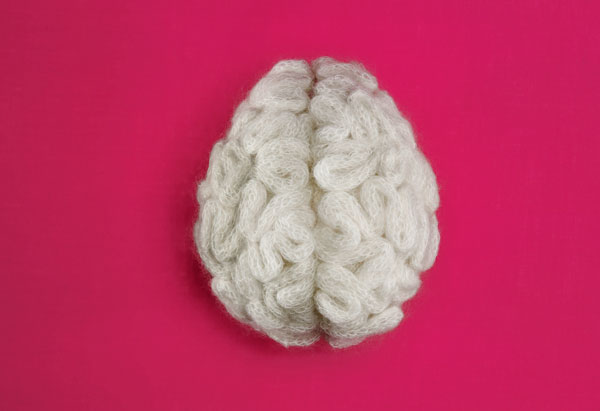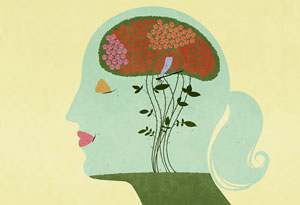You know that startling moment when you can't for the life of you recall why you walked into a room? As we get older, our minds seem less like steel traps and more like sieves. But here's some good news for your 100 billion neurons: Just as the brain can get weaker, it can also grow stronger. Scientists are finding more and more things you can do to invigorate your noggin. Start with this lineup of smart tricks.

1. Volunteer
Stimulates: The prefrontal cortex, which analyzes, plans, and problem-solves
Why: A Johns Hopkins study found that older women who tutored kids for six months developed sharper cognitive skills. The social and mental activity required for teaching sends blood rushing to this part of the brain.
2. Work out
Stimulates: The hippocampus, which forms memories
Why: Arthur Kramer, PhD, a researcher at the University of Illinois, used MRIs to show that exercise actually makes your hippocampus bigger. Physical activity may increase the number of capillaries in the region, which in turn helps new cells grow. Kramer prescribes one-hour sweat sessions three times a week.
3. Learn a skill
Stimulates: The intraparietal sulcus, which directs hand-eye coordination
Why: At Oxford University, researchers taught 24 people to juggle and found that after six weeks this region had a higher density of white matter (the fibers that let neurons communicate). Any novel activity that is practiced intently, such as tennis or guitar playing, will likely have this effect, says study author Heidi Johansen-Berg.
Next: Why wiggling your eyes can save your memory

Illustration: Shout
4. Keep the weight off
As the number on the scale creeps upward, it's hard to imagine that anything's getting smaller, but extra pounds can actually shrink your brain. In a 2009 study, brain scans of older adults revealed that overweight individuals had an average of 4 percent less brain tissue than normal-weight folks. And in obese people the loss of tissue was so significant that their brains appeared 16 years older than those of thinner people.
"By eating more calories, you're also consuming more fat," says study author Paul Thompson, PhD, a neurology professor at UCLA School of Medicine. "The fat clogs arteries that feed the brain, which in turn causes brain cells to wither." That loss can impair memory, mood, movement, speech, and more.
Though the first priority is getting down to a healthier weight, you can also focus on strengthening the brain cells you've got. Aerobic activity will not only help you shed pounds but increase the amount of blood, oxygen, and nutrients flowing north to your neurons. And more nourishment means a faster processor.
5. Wiggle your eyes
Can't remember where you stashed your glasses? Try looking from side to side. Rapid horizontal eye movements cause the brain's two hemispheres to interact with each other more efficiently, explains memory researcher Andrew Parker, PhD. In moments of temporary amnesia, that action may help you pull up information.
6. Take a snooze
In a University of California, Berkeley, study, participants improved their scores on a memory test by 10 percent when they repeated the test after catching some z's. (Nonnappers saw a 10 percent decline in their scores the second time they took the quiz.) Here's why: New facts enter your brain like e-mails arriving in your in-box. And as your in-box can overflow over the course of a day, so can your brain. During sleep, your brain shuffles recently received data into storage, creating space for fresh info.
7. Eat brain foods—rich in B12, antioxidants, or essential fatty acid
Next: Watch out for these memory stealers
As the number on the scale creeps upward, it's hard to imagine that anything's getting smaller, but extra pounds can actually shrink your brain. In a 2009 study, brain scans of older adults revealed that overweight individuals had an average of 4 percent less brain tissue than normal-weight folks. And in obese people the loss of tissue was so significant that their brains appeared 16 years older than those of thinner people.
"By eating more calories, you're also consuming more fat," says study author Paul Thompson, PhD, a neurology professor at UCLA School of Medicine. "The fat clogs arteries that feed the brain, which in turn causes brain cells to wither." That loss can impair memory, mood, movement, speech, and more.
Though the first priority is getting down to a healthier weight, you can also focus on strengthening the brain cells you've got. Aerobic activity will not only help you shed pounds but increase the amount of blood, oxygen, and nutrients flowing north to your neurons. And more nourishment means a faster processor.
5. Wiggle your eyes
Can't remember where you stashed your glasses? Try looking from side to side. Rapid horizontal eye movements cause the brain's two hemispheres to interact with each other more efficiently, explains memory researcher Andrew Parker, PhD. In moments of temporary amnesia, that action may help you pull up information.
6. Take a snooze
In a University of California, Berkeley, study, participants improved their scores on a memory test by 10 percent when they repeated the test after catching some z's. (Nonnappers saw a 10 percent decline in their scores the second time they took the quiz.) Here's why: New facts enter your brain like e-mails arriving in your in-box. And as your in-box can overflow over the course of a day, so can your brain. During sleep, your brain shuffles recently received data into storage, creating space for fresh info.
7. Eat brain foods—rich in B12, antioxidants, or essential fatty acid
- Bananas (Get the recipe for Banana Cinnamon Smoothies)
- Kale (Get the recipe for Spicy Parmesan Green Beans and Kale)
- Tomatoes (Get the recipe for Grilled Pizza with Goat Cheese, Tomatoes and Thyme)
- Blueberries (Get 8 blueberry recipes)
- Swiss cheese (Get the recipe for a classic Muffuletta sandwich)
- Chocolate (Get the recipe for double chocolate loaf and more decadent retro desserts)
- Salmon (Get the recipe for healthy Lemon Salmon with Garlic Spinach)
- Brussels sprouts (Get the recipe for Balsamic Glazed Brussels Sprouts with Bacon and Bread Crumbs)
- Apples (Get the recipe for Maine Crab, Green Apple and Avocado Salad with Parmesan Tuiles)
- Olive oil (Get the recipe for Olive Oil Vinaigrette)
- Coffee beans (Get 8 caffeine infused coffee recipes)
- Oranges (Get 8 citrus recipes, from entrées to dessert)
Next: Watch out for these memory stealers

Photo: Thinkstock
How to avoid health problems that can hurt your brain.
8. Thief: Chronic StressThe Damage: Prolonged exposure to the fight-or-flight hormone cortisol and other brain chemicals can actually kill neurons by exciting them to death.
The Fix: Stay connected. A six-year Harvard University study of 16,638 people found that those with the largest social networks had the slowest rate of memory decline. Family and friends can mute the intensity of stress—and the brain's chemical response.
9. Thief: Cholesterol
The Damage: If plaque gets lodged inside one of the tiny blood vessels in your brain, it can cause a "silent" stroke (the kind you don't even know you've had). The harm this can do to your brain tissue could slow the speed at which you absorb new information.
The Fix: In addition to eating a healthy diet and getting plenty of exercise, go nuts for nuts. Eating about 2.4 ounces a day can lower bad cholesterol by ten points. The type of nut doesn't seem to matter, though raw nuts are healthiest.
10. Thief: Sleep Apnea
The Damage: In this disorder (marked by loud snoring and exhaustion upon waking), your airway spontaneously closes or becomes blocked for several seconds at a time. The result—a dip in the oxygen level in your blood, which can cause brain cells to starve.
The Fix: Studies show that losing 10 percent of your body weight is enough to improve symptoms. And your doctor may recommend using a CPAP (continuous positive airway pressure) machine while you sleep. It fits over your nose and mouth and generates a steady flow of air to keep the airway open.
11. Thief: Hypothyroidism
The Damage: An underactive thyroid slows metabolism, which leads to fatigue, which leads to a foggy brain. One of the symptoms of this disorder, affecting about 17 percent of women 60 and over, is difficulty committing new info to long-term memory.
The Fix: A common cause of the problem is insufficient levels of iodine, which the body needs in order to produce thyroid hormones, so seek out lots of iodine-rich foods, such as seafood and dairy products.

This article is part of Oprah.com's 2011 Feel Good Challenge. Join now—and move closer to the life you want!
Related Resources
Illustration: Plamen Petkov




